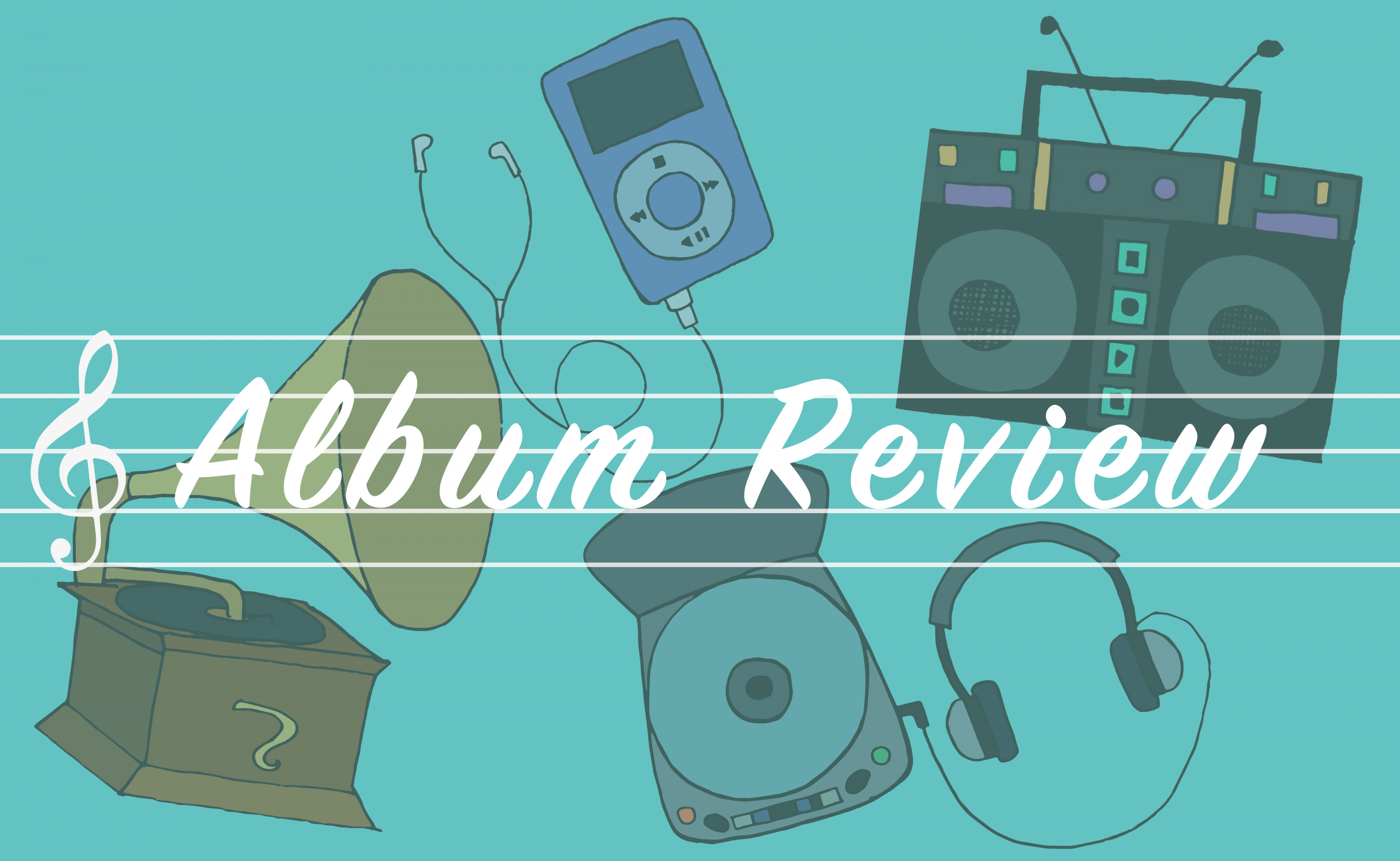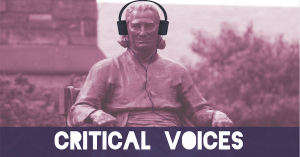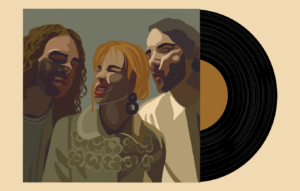The year 2022 marks the upcoming thirteenth anniversary of Julian Casablancas’ debut solo album Phrazes for the Young (2009). Why is this significant? It’s not, really; I just wanted a reason to wax poetic about this masterpiece of an album. Not that I needed an excuse or anything.
Casablancas might be most well known for his role as the frontman of The Strokes, and for good reason. The New York rock band is responsible for producing two decades’ worth of bangers like “Is This It,” “Someday,” “Reptilia,” and more recently, “The Adults Are Talking.” Throughout the band’s discography, Casablancas brings his unique style of singing ranging from distorted mumbling to delicate and clear falsetto. However, Casablancas shines the most when he steps away from the mainstream, Strokes-fueled spotlight and dabbles in more experimental territory, as seen by his solo album Phrazes as well as his involvement with the avant-garde and crunchy band The Voidz. Less constrained by others’ opinions on these side projects, Casablancas is able to explore a wider variety of themes and exercise more creative freedom.
And explore them he does: Phrazes’ eight tracks cover topics like irrationality and suffering, societal issues, the inevitability of change, love and loss…basically the whole gamut of the human experience. Thirty-one at the time of the album’s release, with three Strokes’ albums already under his belt, Casablancas allows his jadedness and his disillusionment with stardom to seep into his lyrics to create a belated coming-of-age story. The album opens with the track “Out of the Blue,” with upbeat guitars and drums contrasting more conflicted lyrics: “Somewhere along the way, my hopefulness turned to sadness / Somewhere along the way, my sadness turned to bitterness,” Casablancas sings in a slight remorseful tone. However, he sprinkles in a bit of nonchalant acceptance and snarkiness with the line, “Yes, I know I’m going to Hell in a leather jacket / Least I’ll be in another world while you’re pissing on my casket.” In “Left & Right in the Dark,” Casablancas grapples with the unstoppable passage of time, reminiscing about running carefree as a four-year-old and the unsettling feeling of watching life pass you by. “Wait up, wait up / Oh wake up, wake up,” he sings, fruitlessly calling out for time to stop and for people to open their eyes and realize that this life is fleeting. For me, one of the most poignant lines of the album comes from this song: “Your Achilles heel is you like to feel your fingers on the wheel.” Here, Casablancas identifies the human need to feel some sort of agency over our lives, to have control and feel like we are happening to life, rather than the other way around. However, perhaps it is our hubris that makes us think we can master the world around us, when life moves forward and waits for no one. These heavier topics are sung over peppy synth-pop flavors, sending the message to not take things too seriously because nobody is getting out of here alive.
The album also touches heavily on a sense of personal identity and relationship to society. Casablancas seems conflicted about his place in the world and what impact he leaves on it. “You are looking for your own voice but in others / While it hears you, trapped in another dimension,” he sings in “11th Dimension,” addressing how he feels constrained by the opinions of others and unable to express, or unaware of, his authentic self. This theme shows up repeatedly throughout the album, such as in the song “River of Brakelights” with the lyrics “Finding the dreams you left behind to do, waving goodbye your young heart cries for you.” These melancholy lyrics are reminiscent of young and naive dreams crushed by the process of growing old, yearning for realism to be less cruel.
Along the same vein, Casablancas doesn’t shy away from political and social commentary. He brushes upon topics of tribalism in “11th Dimension” as well with lyrics like “I live on the frozen surface of a fireball / Where cities come together to hate each other in the name of sport.” Here, he points out how quickly people can become polarized over issues as insignificant as sports teams. Casablancas also ponders a changing Lower East Side in “Ludlow Street,” softly crooning over a country-esque waltzy tune. He sings about the inceptions of New York City, built upon stolen Lenape land, and the city’s continued transformation. The lyrics reference the earlier themes of unstoppable and unpredictable change: “Faces are changing on Ludlow St / Yuppies invading on Ludlow St / Night life is raging on Ludlow St / History’s fading / And it’s hard to just move along.” Casablancas recognizes the ever-changing nature of the city, often at the price of injustices such as forcibly taking land or gentrification with the inflow of “yuppies.” This is an interesting critique that seems a bit difficult to take seriously, considering Casablanca’s successful career was made possible by the consumption habits of the same society responsible for this sort of creative destruction. Perhaps we could be generous and argue that Casablancas is aware of his own existence as hypocrisy: in “11th Dimension” he sings “We’re so quick to point out our own flaws in others / Complicated mammals on the wings of robots,” indicating a sort of self awareness about how easy it is to point fingers at everyone but ourselves. Regardless of whether he himself falls prey to this, the lyrics speak for themselves in displaying how humans are complex creatures containing multitudes. We are all complicated and full of contradictions, and when you combine them millions of times, our individual flaws compound upon themselves to create fundamentally flawed societies. Nobody’s fault, really–we’re all imperfectly human. Casablancas’ lyricism brings a different flavor to the standard Rage-Against-the-Machine anger against authority and injustice by acknowledging our individual roles in participating in such a society.
Enough of the depressing we-live-in-a-society commentary; now it’s time for depressing and heartbreaking commentary. Music is the food of love, and no album would be complete without touching upon topics of love in some way. In the penultimate track “Glass,” Casablancas croons soulfully in between guitar riffs and tinkling keyboard, promising his lover that he will shield her from the cruelties of life and the prying eyes of the media with “bulletproof glass.” In an interview with Eye Weekly, Casablancas revealed that this song was written for his wife-at-the-time Juliet’s birthday–doesn’t that drip of romanticism and tenderness? Unfortunately, he and Juliet got divorced two years ago and he is now dating a woman half his age, so perhaps love really is dead. The situation makes the song all the more heart-wrenching, and perhaps Casablancas knew about the fragility and fickleness of love by simply titling the song “Glass” instead of “Bulletproof Glass.” Like all of the songs before it, “Glass” embraces the combination of pain and pleasure that makes up existence. Anything more optimistic would be too off-theme and unrealistic, no matter how badly we want to manifest such a thing.
Phrazes for the Young is a beautiful, heart-wrenching embodiment of feeling a little lost and helpless in a big and confusing world. Listening to it feels like a comforting embrace, a reminder that the world can be a terrible and nonsensical place, but we are existing and persisting regardless. I fantasize about listening to it while mysteriously walking through the New York City crowds on a brisk autumn afternoon while having a mini existential crisis and contemplating my contribution to a fundamentally flawed society. The whole album from start to finish is a masterpiece of beautifully concocted melodies and lyricism, an auditory bildungsroman for constantly changing people in a constantly changing world. After thirteen years, it pains me that Casablancas has not put out another solo album, but Phrazes for the Young is so one-of-a-kind that it is perhaps irreplicable and better left alone. This concludes my love letter to Julian Casablancas.





